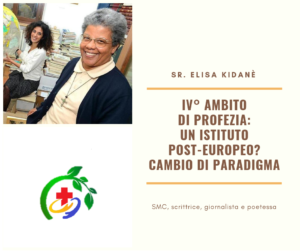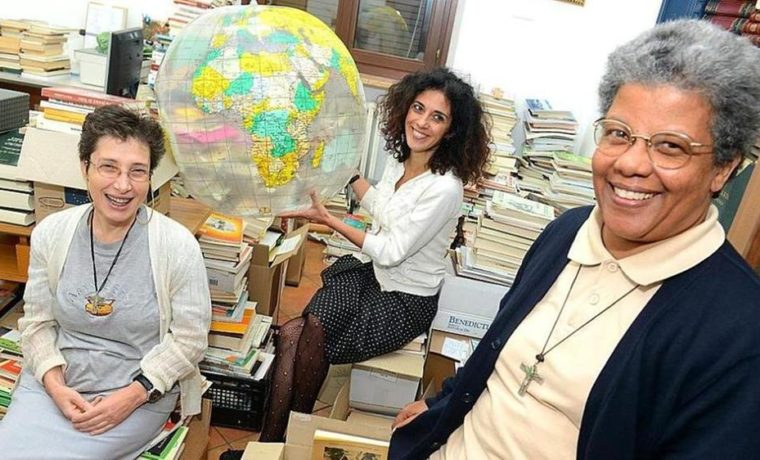 Family Which Camillian Prophecy Today? Between the Past…the Present…and the Future A Post-European Institute? A Change of Paradigm
Family Which Camillian Prophecy Today? Between the Past…the Present…and the Future A Post-European Institute? A Change of Paradigm
By Sr. Elisa Kidane – A Combonian Missionary
Rome 14 March 2019
Today is the last day of your meeting…you already have your plane or train tickets…you are already projected towards your places of work.
I have leafed through the programme of these days, I have read some of the papers that you have listened to, and I really said to myself: what can I say that you have not already heard? In what I have read there is the present, the past and the future.
But then when looking at this hall I said to myself: we are already in the future. We are already living the essence of post-European Institutes. The change of paradigm has already been set in motion.
It is therefore important to speak about the future NOT as something that still has to arrive but as something that is already present and still to come.
In his speech to open the deliberations of this meeting, the Superior General said: in this sense, our itinerary towards the future, journeying with the Samaritan and the Good Samaritan, helps us to transform ourselves into being listeners and humble and prophetic sowers of the mercy of the Father (the Samaritan) during the interior search for ‘that living water’ that quenches our thirst for eternity (the Samaritan woman). What we sow, if there are abundant results and abundant fruit, will be gathered in by others.
From this starts, therefore, that broad, extensive and generous far-reaching approach of the true male disciple and true female disciple of Jesus.
Over recent days people have been here who, I am certain, have placed in your hearts the already and the not yet. They have placed in your hearts that nostalgia for the sea…There is a very fine phrase by the author of The Little Prince that says: ‘if you build a ship, do not gather together men just to collect the wood and share out tasks, but, instead, teach them nostalgia for the broad and endless sea…As soon as this thirst has been awoken in them, men will immediately set to work to build the ship’ (Antoine de Saint Exupéry).
Today it is my task just to give a push to the ship that is in your hearts and is already ready to set off into deep water.
The first push: you cannot go back to your homes as though nothing had happened. This meeting, like those others that you have held over recent years, are like milestones that mark a pathway, a rhythm, a destination. Your responsibility is no small matter. You cannot return as you arrived…You have to go back convinced of what you have deliberated, thought about, dreamt…You have to transmit passion. To live in the future one has to move out of the reassuring apathy of that quiet way of living and instead enter life.
Second push: let us remember the words that Pope Francis gave to us during the Year of Consecrated Life: ‘You have not only a glorious history to remember and to recount, but also a great history still to be accomplished! Look to the future, where the Spirit is sending you in order to do even greater things’ (VC, n 110).
Great things: we must leave mediocrity behind us. Our Founders were men and woman who dared, who looked to the future. They had already seen each one of us. They had already dreamt of this moment. And what about us? We, however much we feel small, and a little frightened by the way in which tomorrow is described, must have the courage to stand on the shoulders of those men and women.
Third push: trust…I found this phrase which it seems to me can summarise to a certain extent what I want to share with you: ‘do not teach your children what you yourselves have learnt because they will live in a different epoch’. To dare to have trust means to hand over the spirit to the new generations. Not the usages that are handed down intact but passion, the charism…which is dynamic, able to be inculturated…like the gospel. Every idea of the present is a gift for the future…The future is not foreseen, it is invented, day by day. The danger that exists in the face of the new that advances is the danger of shrivelling, of pretending that this is not happening to us, of believing that we can go on leaving things as they are – this is what has always been done. But our religious life is not a way of doing things that is learnt once and for all – it is a laboratory in which one draws the courage to dare to have lifestyles of new life from the casket of the Word of God.
Fourth push: preparing for tomorrow. There is an urgent need to ask ourselves through which kind of formation this should be done. Certainly not a formation that is based upon anachronistic models. Rather, a formation that leads the new generations to invent unprecedented pathways in the furrow of that great history of which we are the heirs.
This is certainly frightening. But we cannot run the risk of opening doors to the new and then close this up in paradigms that are already out of date.
A post-European Institute? A change in paradigm…this is where we must begin from. From a new way of transmitting the charism.
In my judgement, there is a risk in this wish, in this desire to make the new come in. One of these risks we have already mentioned…we wanted arms but people arrived and thus absolute panic.
The other risk is eliminating roots, of wanting to go beyond, almost being afraid of considering one’s own history. When we speak about inter-culture we have to bear a principle in mind: it is not that there are emerging cultures and other cultures that will disappear. A change in paradigm does not mean eliminating: it means a slow and intelligent ability to harmonise cultures. A change in paradigm means a change in the methods that have taken place cyclically, and not only today.
Fears about the diverse, rejection of the diverse, in our holy Congregations as well, arise specifically here: from the perception of a veiled threat: now they command; by now it’s over; they are everything…this fear even makes us say: they (non-European vocations) are too numerous. And thus although, on the one hand, there is a wish to safeguard the Institute, on the other an ‘invasion’ is feared.
And then there is the disquiet of those who were in a minority until a little time ago and today feel the need to find space, to hold posts…
And so it is that we must leave such forms of extremism behind us.
The new paradigm for Catholic and thus universal Institutes is to grow together towards a charismatic citizenship. Where we all feel at home. And where there is a single goal: to proclaim and promote the Kingdom of God Lk 4:18-19). HERE AND NOW. An old and always new paradigm.
It is true that globalisation has drawn cultures closer to each other, but it has also brought conflicts, form of resistance and rejection. For this reason, we have to seek to move from multiculturalism to inter-culture where there emerges a need for relationships, to avoid forms of ethnocentrism and populism. Beginning, obviously enough, from our religious communities which today, more than ever before, have to become workshops where we learn, where we practice to enter respectful dialogue with differences.
In the end it will not be important where we come from: rather, what will matter is where we are going – to be consecrated people for the ministry of comfort, of care, is to set off on the roads of the world, in the wards of hospitals, pouring oil on wounds and lacerations, allowing ourselves to be evangelised by these people whom we encounter every day, by their witness of remaining at the foot of the cross, and by the hope that never disappears in them. An old and always new paradigm.
If we remain anchored in distinctions regarding origins, we will never manage to set off into deep water…diversity is riches as long as we do not make it a pretext for defending ourselves.
It is a fine thing to be here today to plan, to imagine, to invent a future of a new life, where men and women finally become aware that it is together that we will save ourselves and save this humanity that is an orphan at the level of relationships.
The challenge of evangelisation in such a complex world requires this capacity to Live in the world, to foreshadow history and not allow history to make us engage in change. We must use our energies above all:
- To have a profound impact of the quality of life of human beings.
- To promote justice.
- To be protagonists in the building of the Kingdom.
- To be paladins of an international order that is more just.
- To be elements of disturbance…our being together, the style of evangelical communities, must question, pose doubts…More than providing answers we must raise questions…and above all else AMAZE.
DARING TO ENGAGE IN PROPHECY: this necessarily reminds us that alone we go nowhere. The watchword is Together, conserving our own diversities but looking for the red line that helps us to rediscover the courage of Prophecy. At times we live as separated people in our own homes.
Prophecy: looking at the world fixing our eyes on Christ…involves having contemplative hearts.
DARING TO DREAM OF NEW HEAVENS AND NEW EARTHS: what is important is not how we say this but, rather, not allowing ourselves to be robbed of the joy of evangelisation, now allowing ourselves to be robbed of the enthusiasm of mission, not allowing ourselves to be robbed of the Gospel of Jesus Christ. At times our communities ‘more than having the odour of sheep, smell of what is stale…’
Lastly, a phrase from the Domenican theologian, Sister Antonietta Potente: the most beautiful God is an itinerant God, who walks…And we men and woman of the gospel, consecrated to the Kingdom, must stand up and in the early morning go every day towards the dawn, to heal wounds, to bring oils of reconciliation and of hope. God, obliged by our boldness, will still invent new resurrections, will perform new miracles, will heal this new humanity of ours. And religious life will still have the taste of good News – the authentic paradigm.















Camillians on Facebook
Camillians on Twitter
Camillians on Instagram